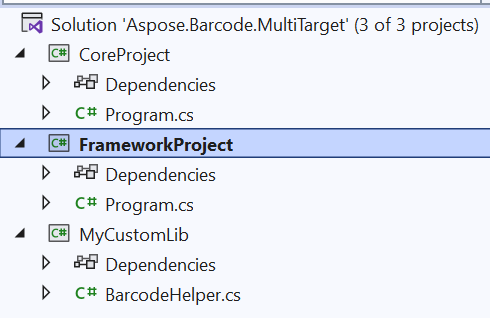Develop custom libraries using Aspose.Barcode for multiple .Net versions in the same project
Overview
This article describes how to develop custom libraries using Aspose.Barcode for .Net for multiple .Net versions in the same project. In some cases, it is required to develop custom libraries which can be used from .Net Framework and .Net Core with the same API. You can use .Net Standard for this, but Aspose.Barcode for .Net uses Aspose.Drawing.Common as graphics library for .Net Standard and in some cases it can be required to use standard System.Drawing which is common for .Net Framework code. In this way you can use multi-targeting to develop custom library for every required targets framework.
You can anytime download the example application.
Create .Net projects
You need to create solution with three projects, where the project tree looks like on image:

- MyCustomLib as Class Library which can be used as multi-targeting custom library for .Net Framework 4.8 and .Net 6.0;
- FrameworkProject as Console App which can be used as console application for .Net Framework 4.8;
- CoreProject as Console App which can be used as console application for .Net 6.0.
Update project files to support multi-targeting
You need to update project files to use MyCustomLib as custom library with the same API for both .Net Framework 4.8 and .Net 6.0 projects.
Update MyCustomLib.csproj
At first, we need to update MyCustomLib.csproj and add .Net Framework 4.8 and .Net 6.0 with following row:
<TargetFrameworks>net48;net6.0</TargetFrameworks>
Also we need to add reference to Aspose.BarCode
<Project Sdk="Microsoft.NET.Sdk">
<PropertyGroup>
<TargetFrameworks>net48;net6.0</TargetFrameworks>
</PropertyGroup>
<ItemGroup>
<PackageReference Include="Aspose.BarCode" Version="24.1.0.0"/>
</ItemGroup>
</Project>
Update FrameworkProject.csproj
Update FrameworkProject.csproj with links to MyCustomLib and Aspose.BarCode and set .Net Framework 4.8 as target framework.
<Project Sdk="Microsoft.NET.Sdk">
<PropertyGroup>
<OutputType>Exe</OutputType>
<TargetFramework>net48</TargetFramework>
</PropertyGroup>
<ItemGroup>
<ProjectReference Include="..\MyCustomLib\MyCustomLib.csproj"/>
<PackageReference Include="Aspose.BarCode" Version="24.1.0.0"/>
</ItemGroup>
</Project>
Update CoreProject.csproj
Update CoreProject.csproj with links to MyCustomLib and Aspose.BarCode and set .Net 6.0 as target framework.
<Project Sdk="Microsoft.NET.Sdk">
<PropertyGroup>
<OutputType>Exe</OutputType>
<TargetFramework>net6.0</TargetFramework>
</PropertyGroup>
<ItemGroup>
<ProjectReference Include="..\MyCustomLib\MyCustomLib.csproj"/>
<PackageReference Include="Aspose.BarCode" Version="24.1.0.0"/>
</ItemGroup>
</Project>
MyCustomLib Example Code
We can write the following example code in our custom multiplatform library which we can use in the same way in both applications.
using Aspose.BarCode.Generation;
#if NETSTANDARD2_0_OR_GREATER || NETCOREAPP2_1_OR_GREATER
using Aspose.Drawing;
#else
using System.Drawing;
#endif
namespace MyCustomLib
{
public class BarcodeHelper
{
public static Bitmap GenerateCode128Barcode(string CodeText)
{
BarcodeGenerator gen = new BarcodeGenerator(EncodeTypes.Code128, CodeText);
gen.Parameters.Barcode.XDimension.Pixels = 2;
return gen.GenerateBarCodeImage();
}
}
}
Console Application Code
And now we can write identical code which uses our MyCustomLib multiplatform library for .Net Framework 4.8 and .Net 6.0 console applications
using System;
using MyCustomLib;
using Aspose.BarCode.BarCodeRecognition;
#if NETSTANDARD2_0_OR_GREATER || NETCOREAPP2_1_OR_GREATER
using Aspose.Drawing;
#else
using System.Drawing;
#endif
namespace FrameworkProject
{
internal class Program
{
static void Main(string[] args)
{
Bitmap bmp = BarcodeHelper.GenerateCode128Barcode("Aspose.BarCode");
using (BarCodeReader reader = new BarCodeReader(bmp))
foreach (BarCodeResult result in reader.ReadBarCodes())
Console.WriteLine($"{result.CodeTypeName}:{result.CodeText}");
}
}
}